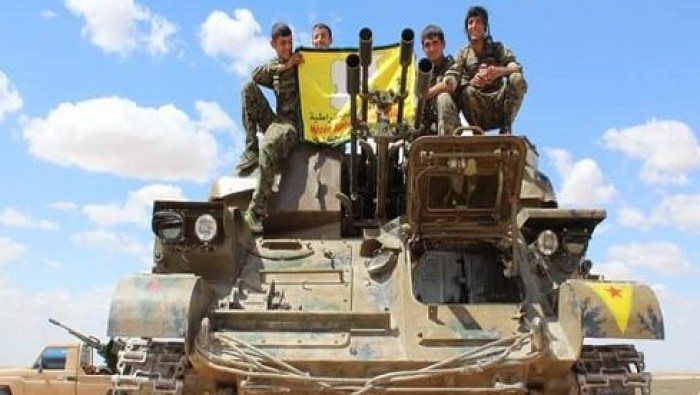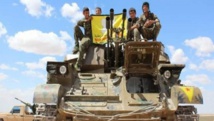But the strategic city is also coveted by Bashar al-Assad's government and its northern rival, Turkey.
Who lives in Raqa?
Located 80 kilometres (50 miles) from the border with Turkey, Raqa is believed to be home to some 300,000 residents, including about 80,000 who have fled there from other parts of the country since Syria's civil war began.
Most of its pre-war population were Arabs, but about 20 percent were Kurds, "concentrated in slums in the city's north", according to French geography expert Fabrice Balanche.
But in 2013, two years into Syria's conflict, rebels and fighters from an Al-Qaeda affiliate seized Raqa. A year later, it fell into the hands of IS and most minority residents fled.
At the time, Syria's Kurds were setting up "autonomous administrations" in territory abandoned by government forces while fighting IS jihadists in the north and northeast.
"Clashes with the Kurds were multiplying, and IS began suspecting that the Kurdish minority in Raqa was some kind of fifth column," Balanche said.
With the departure of Kurds and Armenian and Syriac Christians, "the population of Raqa is today 99 percent Arab Sunni", Balanche said.
Who will rule Raqa?
In mid-April, the SDF announced the creation of a "civilian council" that would be in charge of running Raqa once IS was defeated there.
The council would comprise people originally from Raqa province.
"The council will be in charge of several files, including judicial affairs, healthcare, education, women's and youth affairs, and other public services including security," said Omar Alloush, the council's communication head.
"We have not yet discussed whether Raqa will join the (Kurdish) federal system. This will be decided by the residents after liberation," Alloush told AFP.
But the SDF's hand in creating the council has not reassured adversaries of the Kurds -- including Arab rebel groups and their ally Turkey.
Formed in 2015, the SDF is backed by US-led coalition warplanes and special forces advisers.
The coalition is dominated by the Kurdish People's Protection Units (YPG), which the US recently decided to arm directly for the first time.
That infuriated Turkey, which considers the YPG a "terrorist" group because of its ties to the outlawed Kurdistan Workers' Party.
Turkish President Recep Tayyip Erdogan had previously insisted that Ankara take part in the Raqa offensive, on the condition that the Kurds were excluded.
"The US has asked Erdogan to be patient, and to wait for the city to be taken by the Kurds," said Balanche.
Syria's government has taken an ambiguous position, concerned about the increasing territory held by US-backed forces, but also recently describing the SDF's fight against IS as "legitimate".
Could ethnic conflict erupt?
In Raqa, Balanche said, Kurdish forces are hoping for a repeat of events in Manbij, once a major IS bastion in Aleppo province.
After the SDF overran Manbij in August 2016, it handed over the Arab-majority town to a civilian council.
Adversaries have complained that the council is simply a fig leaf for SDF control, but Manbij's Kurdish minority continues to support it.
"This is not the case in Raqa," said Balanche. "The tribes in Raqa are not ready to accept Kurdish domination."
Faysal al-Sibat, a Syrian member of parliament and a leading member of Raqa tribe Al-Welda, said the SDF fighters "do not have popular support".
"The tribes in Raqa do not recognise this civilian council. And tribal members that are in the council are there in an individual capacity," he told AFP.
What about the regime?
Syria's government has long insisted that its forces would lead the fight to recapture Raqa.
But on the ground, "Syria's army doesn't want to lose any soldiers to take Raqa if the SDF can do it themselves", Balanche said.
Syrian soldiers seized the key town of Maskana from IS on June 4, and are now on the boundary between Aleppo and Raqa provinces.
"The army is positioning itself nearby, waiting for the inevitable problems between Kurds and Arabs -- and among Arabs themselves -- so that it can play the role of a stabiliser," Balanche told AFP.
Government authorities would prefer to "enter the city under a deal" instead of by force, he said.
But SDF spokesman Talal Sello did not rule out the possibility of the Syrian army joining the offensive itself.
"The participation of the Syrian army in the battle depends on agreements between the (Washington-led) coalition and the Russians," Sello told AFP.
---------------------------------------------------------------------------------------------------------------------------
Who lives in Raqa?
Located 80 kilometres (50 miles) from the border with Turkey, Raqa is believed to be home to some 300,000 residents, including about 80,000 who have fled there from other parts of the country since Syria's civil war began.
Most of its pre-war population were Arabs, but about 20 percent were Kurds, "concentrated in slums in the city's north", according to French geography expert Fabrice Balanche.
But in 2013, two years into Syria's conflict, rebels and fighters from an Al-Qaeda affiliate seized Raqa. A year later, it fell into the hands of IS and most minority residents fled.
At the time, Syria's Kurds were setting up "autonomous administrations" in territory abandoned by government forces while fighting IS jihadists in the north and northeast.
"Clashes with the Kurds were multiplying, and IS began suspecting that the Kurdish minority in Raqa was some kind of fifth column," Balanche said.
With the departure of Kurds and Armenian and Syriac Christians, "the population of Raqa is today 99 percent Arab Sunni", Balanche said.
Who will rule Raqa?
In mid-April, the SDF announced the creation of a "civilian council" that would be in charge of running Raqa once IS was defeated there.
The council would comprise people originally from Raqa province.
"The council will be in charge of several files, including judicial affairs, healthcare, education, women's and youth affairs, and other public services including security," said Omar Alloush, the council's communication head.
"We have not yet discussed whether Raqa will join the (Kurdish) federal system. This will be decided by the residents after liberation," Alloush told AFP.
But the SDF's hand in creating the council has not reassured adversaries of the Kurds -- including Arab rebel groups and their ally Turkey.
Formed in 2015, the SDF is backed by US-led coalition warplanes and special forces advisers.
The coalition is dominated by the Kurdish People's Protection Units (YPG), which the US recently decided to arm directly for the first time.
That infuriated Turkey, which considers the YPG a "terrorist" group because of its ties to the outlawed Kurdistan Workers' Party.
Turkish President Recep Tayyip Erdogan had previously insisted that Ankara take part in the Raqa offensive, on the condition that the Kurds were excluded.
"The US has asked Erdogan to be patient, and to wait for the city to be taken by the Kurds," said Balanche.
Syria's government has taken an ambiguous position, concerned about the increasing territory held by US-backed forces, but also recently describing the SDF's fight against IS as "legitimate".
Could ethnic conflict erupt?
In Raqa, Balanche said, Kurdish forces are hoping for a repeat of events in Manbij, once a major IS bastion in Aleppo province.
After the SDF overran Manbij in August 2016, it handed over the Arab-majority town to a civilian council.
Adversaries have complained that the council is simply a fig leaf for SDF control, but Manbij's Kurdish minority continues to support it.
"This is not the case in Raqa," said Balanche. "The tribes in Raqa are not ready to accept Kurdish domination."
Faysal al-Sibat, a Syrian member of parliament and a leading member of Raqa tribe Al-Welda, said the SDF fighters "do not have popular support".
"The tribes in Raqa do not recognise this civilian council. And tribal members that are in the council are there in an individual capacity," he told AFP.
What about the regime?
Syria's government has long insisted that its forces would lead the fight to recapture Raqa.
But on the ground, "Syria's army doesn't want to lose any soldiers to take Raqa if the SDF can do it themselves", Balanche said.
Syrian soldiers seized the key town of Maskana from IS on June 4, and are now on the boundary between Aleppo and Raqa provinces.
"The army is positioning itself nearby, waiting for the inevitable problems between Kurds and Arabs -- and among Arabs themselves -- so that it can play the role of a stabiliser," Balanche told AFP.
Government authorities would prefer to "enter the city under a deal" instead of by force, he said.
But SDF spokesman Talal Sello did not rule out the possibility of the Syrian army joining the offensive itself.
"The participation of the Syrian army in the battle depends on agreements between the (Washington-led) coalition and the Russians," Sello told AFP.
---------------------------------------------------------------------------------------------------------------------------









 Home
Home Politics
Politics











